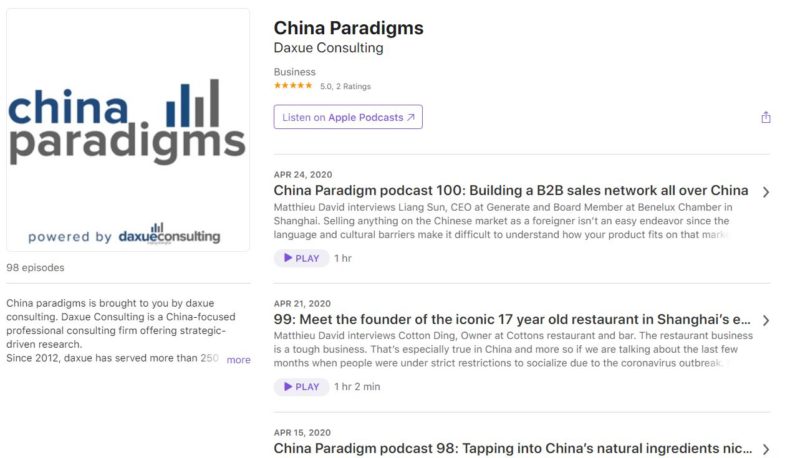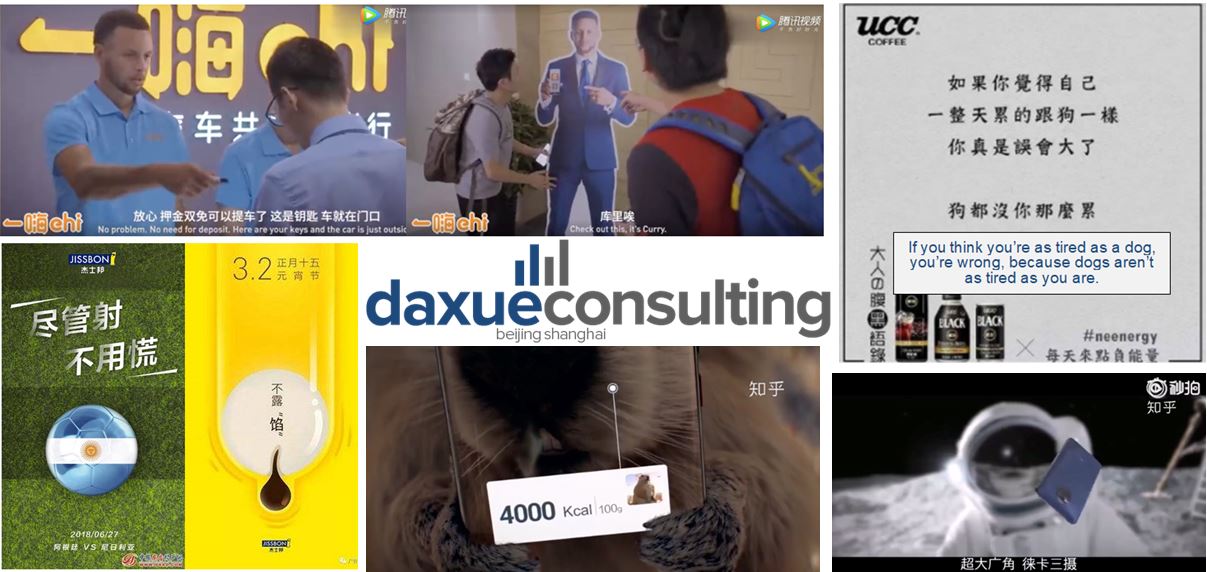Navigating the Chinese sense of humor can be incredibly difficult for individuals, let alone brands marketing to Chinese consumers. Although appealing to Chinese through funny advertisements is certainly effective, brands must understand the barriers, the taboos, versus the sweet spots of Chinese humor.
The first thing that westerners need to wrap their head around when approaching Chinese humor, is that Chinese do not regard humor as highly as the west. Hence humor is often subtle, metaphorical, and left to the professionals.
Chinese humor in marketing
Humorous marketing is an effective strategy for promoting brands and products in China. It is easier to communicate with consumers by resonating emotionally through jokes. Using impressive creations, brands can expand their consumer awareness by inviting audiences to discover their in-depth value proposition.
However, the Chinese sense of humor differs from that of Westerners. This cognitive opposition is reflected in the use of different humorous approaches in advertising. Thus, the gap between Chinese and Western humor makes it necessary to modulate marketing strategies. By comparing to the west, this article will provide you an insight into humor through the lese of China’s advertisement business.
What is the Chinese sense of humor?
Development of humor in China as a subtle and metaphorical art
Humor has played a significant role in Chinese culture for thousands of years and has formed distinctive features. Dating back to two thousand years ago, there were already comedy books (“Shiji”, 104 B.C) in China. These comedies mock certain aspects of ancient Chinese lives using puns, metaphors and satire.
In the Qin Dynasty, many fairy tales had become popular. These tales used humor to subtly ridicule the government’s corruption. Gradually, humor was widely adopted by Chinese poets and perceived as an astute writing approach. Plus, the target and intention behind humor differed with dynastic changes in Chinese history. Chinese poets often leveraged metaphors and puns to express their patriotism and disappointment with the government. Thus, the content expressed by humor is deeply influenced by social context in China’s history.
In fact, Chinese perceptions towards humor are somewhat contradictory. On the one hand, there were many philosophers in China’s history who preached a culture of humor. Taoism sees humor as “an attempt of having witty, peaceful and harmonious interactions with nature”. On the other hand, Confucianism sees humor as a restriction on self-value actualization. Confucius, who prizes self-esteem and respect, has tremendous influence on modern Chinese society. Hence, it is no surprise that the Chinese are not a nation who highly values humor, though it has a long history.
Understanding Chinese sense of humor through a western lens
Humor is universal yet unique across every culture. In the west, people regard humor as a positive trait and a natural emotional expression. Psychologically, humor is a great way to release fear and anxiety, providing an amusing, funny perspective toward people’s inner selves. Westerners believe it is mentally beneficial to use humor to show happiness and cope with awkward situations. Hence, in the west, humorous people are thought to be more attractive, creative and capable.
In sharp contrast, the attitudes towards humor in the middle kingdom turn western ideologies on their head.
Chinese do not generally believe that humor is a positive personality trait. There are three main reasons for this. The first is that all Chinese appreciate humor but feel they lack a funny personality. Second, many believe being funny does not contribute to self-realization by Confucius standards. Lastly, is that humor is not a necessary quality but an inherent advantage of humor ‘experts’, in other words, many Chinese believe that humor is best when left to the professionals.
Comparing humor of Chinese and Westerners
Preferences for humor can be measured on these two spectrums: self-enhancing vs. self-defeating, affiliative vs. aggressive. Self-enhancing vs. self-defeating measures whether the comedian is enriching their own image, or poking fun at themselves. Affiliative vs. aggressive measures to what extend the comedian is bringing people together or targeting others.
Chinese are more likely to use affiliative and self-enhancing humor. Since Chinese are collectivist and deeply influenced by Confucianism’s ideology of self-esteem. Although, some modern Chinese humor styles would fall into an ‘affiliative + self-defeating’ category, as seen in the ‘Sang’ humor embraced by millennials and generation Z.
In contrast, North Americans use all humor types moreoften than their Chinese counterparts, but especially tend towards aggressive humor. This is because westerners don’t see humor as a sign of aggression as Chinese do, and they are more individualistic than Chinese.
Additionally, Hong Kong students revealed more use of aggressive humor and self-defeating humor, and less use of affiliative and self-enhancing humor than mainland Chinese students. This could be due to the significant amount of western influence in Hong Kong.
What Chinese advertisements can teach us about the Chinese sense of humor
“Sang” culture, a kind of self-defeating, affiliative humor that is thriving among Chinese millennials
“Sang” culture is stemmed from Chinese ironic defeatism, or admitting defeat to life’s overwhelming stress. It is fuelled by internet celebrities, through music, TV shows and sad-faced emojis and pessimistic, yes relatable, slogans.
“Sang” culture reflects Chinese millennials’ desperation among fierce competition for jobs, large burden of buying apartment and requirement for marriage. “It would be great if I could just wake up to retirement tomorrow,” this is an example of “Sang” culture. Essentially, “Sang” culture is not the self-destruction of Chinese millennials, yet a self-defeating emotional vent to acquire social agreement (an affiliative aspect). Disadvantaged group can express their powerless to social phenomena to find community in a group with similar experiences.
The branding and marketing of “Sang” culture
Such ironic humor is so fit for young Chinese that a tea shop completely embraced the culture in their marketing. Interestingly, the initial idea of Sang tea was to go up against another Chinese tea chain giant, Hey Tea. The reverse branding concept of Sang Tea (pessimism) with Hey Tea (optimism) quickly attracted mass of young Chinese who relate to Sang culture.
The store’s teas are packaged with ‘Sang’ slogans, and branded in all black. When you first read their tagline, you’d think it was the sensible thing to say, but it turns out to be a merciless mockery. This anticlimactic turn of events makes customers feel surprisingly inclined to laugh.
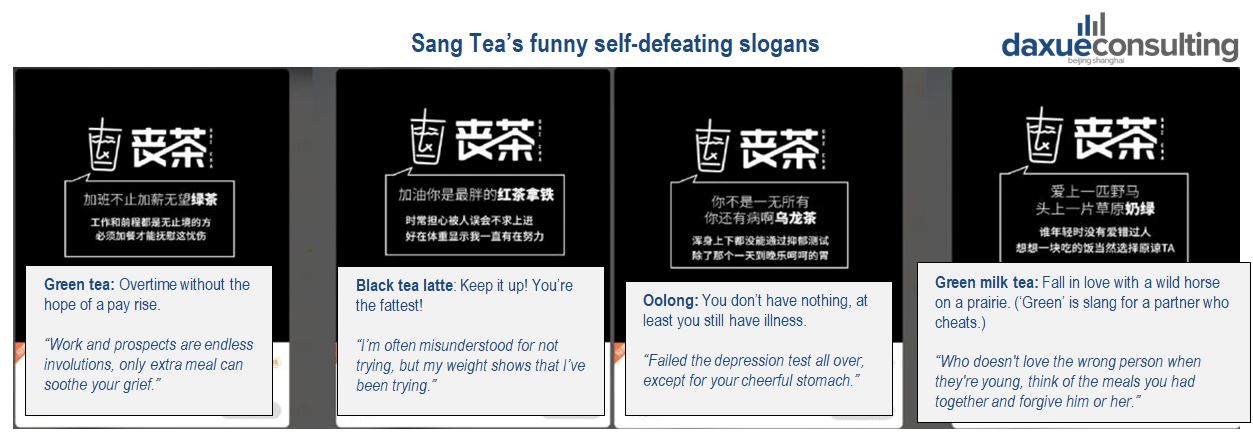
Source: Zhihu, Sang Tea’s funny self-defeating slogans
How to use Sang culture in marketing
On the one hand, “Sang” marketing can increase brands’ exposure, create opportunities connecting products and consumers. On the other hand, ironic taglines can be recognized by specific consumers, promoting marketing to convert sales. In this bustling environment, Chinese young people’s common pain spots are urban loneliness and anxiety disorders.
Thus, to resonate emotionally with consumers, the product needs to have two attributes. First, products should have communication power to develop interaction with consumers based on consuming scenes and different groups. Secondly, products should have social attributes, can create topics, triggering consumers’ independent sharing.
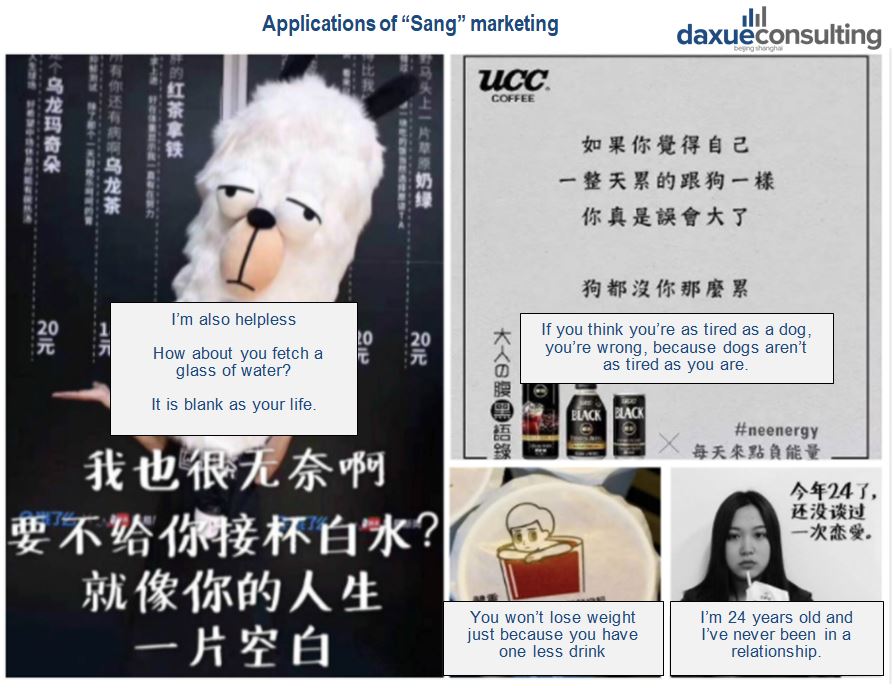
Source: Dititaling, Series of applications for “Sang” marketing
Chinese satire in marketing inspired by general social phenomenon
Chinese have slangs that exist to name social phenomena, such as ‘head-down’ species, for those who always have their heads down looking at their phones. The Chinese car rental company Ehi poked fun at this existing phenomena a TV commercial.
In the ad, NBA player Stephen Curry acts as an Ehi employee serving customers at the front desk. However, customers in the ad were so focused on their phones that they didn’t realize it was Curry who was serving them. Moreover, some customers in the ad were surprised by Curry’s poster yet never never noticed he was really there.
After pushing this satirically humorous advertisement, which doubles as a celebrity endorsement, Ehi has expanded its brand awareness in a rapid pace. It is relatable for Chinese, they either watch the ad and think “That would have been me” and laugh at themselves, or some may think “I’m not like all the other head-down species” and relate to poking fun at these ‘phone-addicts’. This humor can be classified as self-enhancing + affiliative humor because it is relatable, and gently makes fun in a good-natured way.

Source: Zhihu, Stephen Curry in Ehi’s advertisement
Funny metaphors in Chinese advertising
Metaphors are a clever approach to convey brand’s value to audience in a funny way. Especially in China, brands need to be aware of some taboos, and metaphors can help them navigate the minefield of taboos.
For instance, Chinese are conservative about sexuality, thus Chinese condom producer Jissbon leveraged metaphorical humorous advertisements to navigate the touchy topic. During the World Cup, Jissbon used a football with the emblem of Argentine national to subtly promote its condom.
With a remark of “Don’t worry, just shoot”, it is easy for consumers to associate the football with sex. Besides, Jissbon also used Chinese traditional elements to skillfully display its condom’s trustful security. For example, during the Chinese lantern festival, Jissbon introduced a package design printed with a dumpling. Through the juices flowing out and the yellow background, a mature audience can clearly understand this cryptic expression.
Jissbon is not the only condom giant in China, to use metaphors. Durex also reveals high preference on metaphorical humorous advertising.
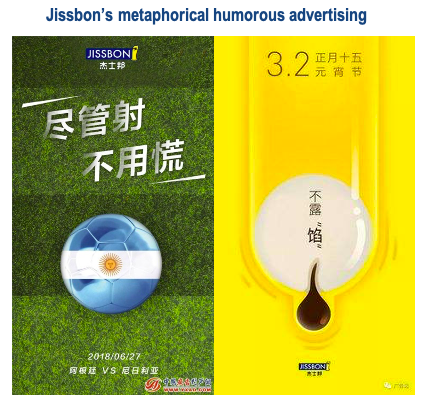
Source: Zhihu, Jissbon’s metaphorical humor
How brands use Chinese puns in slogans
The use of punny (pun + funny) slogans has a spot-on effect. In Chinese, each word can have various meaning in different sentences and contexts, which vests great possibilities to use puns.
Punny slogans have three aspects that the brand side should be aware of. First, it should be concise, cost-effective and can exactly convey brand value to consumer in a short time. Secondly, the humorous language style of puns should be highly appealing to the audience. Moreover, the puns should be relevant to the product.
Some common Chinese pun tactics are as follows
Semantic puns use words or sentences to create doublespeak in a particular context. For example, the health company Tianda’s slogan, “your health is a big deal.” “Big” has two meanings here, it can be an adjective modifying “deal”, it is also the name of the medicine company, Tianda (天大). Thus, consumers can understand that their health is related to its business.
Homophonic puns use words with the same pronunciation. The slogan of a Chinese company producing zinc gluconate oral solution perfectly interprets the cleverness of homophonic puns. “A good mother will use zinc to nurture her child”, “Zinc” has the same pronunciation with “heart” in Chinese. Hence, the sentence can alternatively be thought as “A good mother will use heart to nurture her child”.
Grammatical puns use different grammatical functions of a word. For instance, the tagline of Chinese bra company Tingmei is “做女人挺好”. It can be initially comprehended as “It’s good to be a woman”. However, Tingmei subtly used the different grammar of “挺” (tĭng, can be an adjective like “good” and a verb signifying “lift up your chest”). Thus, this tagline can be comprehended as “Be a woman and lift up your breast”, echoing their products.

Source: Zhihu, examples of puns in advertising
Spoof humor in Chinese marketing
Huawei is particularly fond of using spoof humor to present its creative products. In one example, a pair of Chinese astronauts was carrying out a discovery mission on the moon. One of them tried to take pictures of the moon yet failed several times due because the phone they were could not zoom out far enough. Suddenly the plot twisted, and the astronaut took out a Huawei mate 20 and used its super wide-angle shooting and high-definition image quality to complete the mission.
In another Huawei spoof commercial promoting its heat sensing function, a squirrel was in danger of being caught by an eagle. At this critical juncture, the squirrel took out a Huawei showing that 100g of squirrel meat contains 4,000 kcal. Eventually the eagle was scared off by the high calorie content of squirrel meat.
In another ad, to show its wireless charging function, the Huawei phone was transformed into a curling match. The situation was tense as athletes work hard to wipe down the floor to let the Huawei phone hit the bulls-eye, which was a wireless charging port. In the end, the Huawei phone was right on the target and started charging.
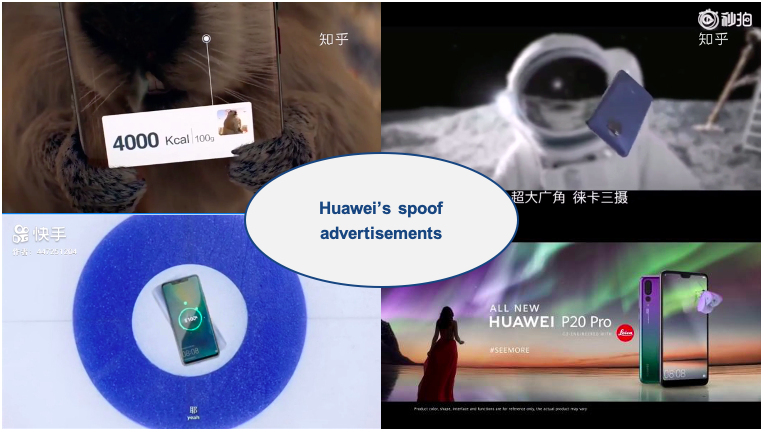
Source: Zhihu, Huawei’s spoof advertisements capture Chinese sense of humor
Comparison of Chinese and Western humorous advertising
China and the United States differ in their openness to the degree of subversion or absurdity of advertising. U.S. humorous advertising is significantly more subversive than China’s due to the influence of an inherently open culture and a more liberal marketplace. Chinese subversion is generally in line with China’s mainstream values. It cannot conflict with the existing socialist system, nor can it harm the interests of the people. At the same time, it cannot contradict the traditional habits of the Chinese nation. For example, a chewing gum advertisement was boycotted by the censorship because it featured a beautiful actress with the slogan “Do you want to kiss?”.
Secondly, the difference between Chinese and American humorous advertising is reflected in individualism and collectivism. American humorous ads are strongly influenced by traditional individualism, and the spokesperson and the advertising words will highlight the experience or benefit that the product brings to the individual. In contrast, Chinese humorous advertisements are more collective in nature. For example, a classic Chinese shampoo advertisement has the slogan “What’s good for everyone is really good, Guangzhou Haodi”.
Status and prospect of humorous advertising in China
It is obvious that the expressive force of humorous advertisements in China is still behind Western countries. However, China’s advertising industry is blooming with design improvement and increased consumption. In 2018, China’s new advertising law has curbed China’s advertising industry with harsher measures. Meanwhile, the advertising industry in China also keeps pace with country’s technological transformation. Online channels like social media are becoming targeted marketplace of brands’ humorous advertising, and AI is also playing an significant role in defining consumer demographics. If you have any question about China’s market, reach our project team at dx@daxueconsulting.com
See our report on branding in China
Listen to 100 China entrepreneur stories on China Paradigms, the China business podcast
Listen to China Paradigm on Apple Podcast
